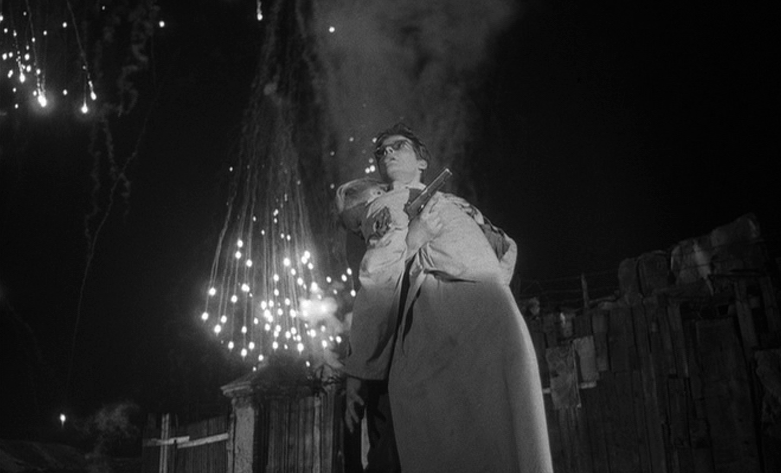Wednesday, July 17, 2013
ASHES AND DIAMONDS (Andrzej Wadja, 1958)
Despite being critically praised, the films of Andrzej Wadja are criminally underwatched, and largely forgotten. Unlike the other underwatched filmmaker I constantly laud, Luis Bunuel, Wadja carries little name recognition despite the truly marvelous work that he often does. Ashes and Diamonds, made in the height of communist Poland in 1958, captures the tumultuous period of the nation at the tail end of WWII.
From the first scene, the audience is instantly drawn in by three soldiers- a hardened commander, a double agent who also works for the communist leaning mayor, and Maciek, a young aloof soldier- and their botched attempt to assassinate a communist official. However, although we see most of film through Republican soldiers, the film refuses to make the targeted communist official a villian. We even see him attempting to rescue his long lost son from imprisonment, a move that ultimately seals his fate but allows us to view him in a very sympatetic light.
When viewing Ashes and Diamonds, it is obvious that Wadja watched many American films of the time, notably Citizen Kane. Wadja utilizes deep focus in ways similar to Wells and constantly uses low angles and shadowy surroundings to emphasize the action. The film's climax just looks stunning, as the action occurs as fireworks celebrating German surrender explode in the background. One would think that sequence would only truly work in color so we could see the bright lights of the explosions, but I don't think that's true after seeing it. The white sparks against the black sky and grey figures is such a captivating memorable image, especially with the tense long take delivering the film's narrative climax.
The film's strongest dynamic comes from its three leads. Maciek, the dreaming, relaxed, sunglass-wearing young man, falls in love and is quickly torn between his country and himself. Maciek shines in an early scene where he manipulates an old hotel clerk to give him a premium hotel room by discussing the old days of Warsaw, before the Uprising and destruction of most of the city. Maciek still has his eyes on using the old man, but is truly lost in the memories of the old city.
However, perhaps the most entertaining storyline regards the double agent, as he lets an old drunkard in to an exclusive government engagement, and likely loses his job in the ensuing chaos. Drewnowski, uptight and seen as stupid by Maciek and Andrzej, the senior officer, allows himself to celebrate the German defeat and is soon coaxed in to drinking heavily by an old dunk man. Drewnowski, while intoxicated, can no longer keep his double life separate, and causes a scene by insulting the lauded mayor and allowing the old man to flip over tables. He loses his job, but when drunk, he doesn't care. We never get to see his reaction when he comes to the next morning, but that is a great thing. We get to debate ourselves what he thinks. Is he upset? Relieved? The character is so well written it could go either way.
Wadja's film deserves to be seen more frequently. While it takes much from American cinema, cinema at a whole has taken much from it. It's loose structure, multitude of characters yet contained setting can be seen in many modern film, such as the work of Robert Altman. Ashes and Diamonds is a all around great film, whose influence is greater than its current recognition.
Labels:
Altman,
Citizen Kane,
classic review,
Wadja
Subscribe to:
Post Comments (Atom)

No comments:
Post a Comment